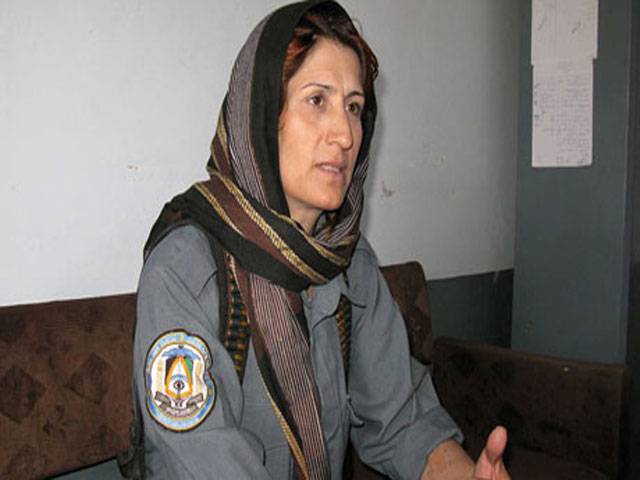KANDAHAR : The top policewoman in Afghanistan's restive south died Monday after being shot by assassins, just months after her predecessor was gunned down, in the latest attack to highlight the threat to women in public life.
Nigar, who only used one name, was shot on the street in Lashkar Gah, the capital of Helmand province, on Sunday and died of her wounds in hospital.
"I can confirm that Nigar died in the emergency unit of the hospital this morning," provincial government spokesman Omar Zawak told AFP. "She died from a bad injury to her neck."
Her predecessor as the most senior woman police officer in Helmand, Lieutenant Bibi Islam, was seen as a high-profile symbol of how opportunities have improved in Afghanistan since the repressive Taliban regime was ousted in 2001.
But before her murder in July, Islam admitted receiving regular death threats from people who disapproved of her career -- including from her own brother.
The deaths in Helmand follow the murder of female police Lieutenant Colonel Malalai Kakar in neighbouring Kandahar province in 2008, and the killing of two successive women's affairs directors in Laghman province within months last year.
And earlier this month, masked gunmen in the eastern province of Paktika shot dead Indian author Sushmita Banerjee, whose book about her escape from Islamist militants in the 1990s became a Bollywood film.
Nigar, 38, was at first expected to survive her injuries after she was shot on Sunday morning as she walked near the police headquarters in Lashkar Gah. Her killers were riding a motorbike and escaped the scene.
She had worked for seven years in the police crime branch in Helmand, a hotbed of the Islamist insurgency that erupted against the US-backed Kabul government after the fall of the Taliban.
She was the mother of a son and a daughter and was based at Lashkar Gah airport after reaching the rank of investigator. Before Helmand, she had been posted in the capital Kabul.
After Islam was killed, Nigar told local media that she was not scared of being a policewoman in ultra-conservative Helmand and that she was determined to continue doing a job she loved.
She said that she had also received death threats, but that Afghanistan needed more female police officers to protect women who often suffer repression, sexual violence and discrimination.
No one has claimed responsibility for the murders of Islam or Nigar, and no arrests have been made.
Women's improved status is a key focus of international efforts in Afghanistan, with foreign diplomats often pointing to more female school children and greater freedom for women as signs of progress.
But donor nations have also raised fears that such advances are at risk as Islamist groups seek to increase their influence with presidential elections due in April and 87,000 NATO-led troops withdrawing next year.
Nigar's death came as nominations opened Monday for the 2014 elections. Any female contenders are unlikely to make a serious impact, although two women did each win a small number of votes in 2009.
There are 66 female MPs in the 249-seat lower house of parliament. One of them, Fariba Ahmadi Kakar, was freed last week after being taken at gunpoint on a highway and held hostage by the Taliban for a month.
A recent Oxfam report said that women make up only one percent of Afghanistan's police force and as a result women are reluctant to seek justice for rising levels of violence.
"Policewomen often lack basic items, such as uniforms, which male colleagues receive. Many find themselves performing menial tasks," the report said.
There is only one female police officer for every 10,000 women in Afghanistan, and many receive little or no training and are rarely able to investigate crimes or carry out arrests.
"We are not treated the same as the men. Even when we are at the same rank as the men, it is us that the commander asks to make tea or do typing," a female officer told Oxfam.
Thursday, April 18, 2024
Top Afghan policewoman dies after gun attack

Tobacco usage declines after decision on high taxes
April 18, 2024
Enemies of Pakistan are unable to digest investment in the country: Ataullah Tarar
1:29 PM | April 18, 2024
IHC restores Bushra Bibi's appeal for shifting to Adiala Jail from Bani Gala
1:24 PM | April 18, 2024
Hepatitis Challenge
April 18, 2024
IMF Predictions
April 18, 2024
Wheat War
April 18, 2024
Rail Revival
April 17, 2024
Addressing Climate Change
April 17, 2024
Justice denied
April 18, 2024
AI dilemmas unveiled
April 18, 2024
Tax tangle
April 18, 2024
Workforce inequality
April 17, 2024
New partnerships
April 17, 2024
ePaper - Nawaiwaqt
Advertisement
Nawaiwaqt Group | Copyright © 2024





